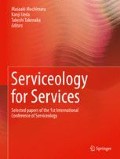Abstract
This chapter evaluates a new mechanism for matching service in perishable goods by using the experimental economics method. This new mechanism employs a double-sided auction mechanism, in which buyers and sellers bid on both prices and date to trade. When compared to another type of double-sided auction mechanism, called the time criticality-based mechanism, this new mechanism achieves more truthful bidding of a date to trade and trading prices that are closer to the market equilibrium prices. However, the new mechanism is less efficient economically because there are fewer transactions.
Access this chapter
Tax calculation will be finalised at checkout
Purchases are for personal use only
References
Metropolitan Central Wholesale Market in Tokyo. http://www.shijou.metro.tokyo.jp/english/marketguide.html
Miyashita K (2011) A realization of B2B seafood trading based on call-market systems, 2011. In: Autumn meeting of the food system research association of Japan, Kyoto University
Green EJ, Zhou RL (2002) Dynamic monetary equilibrium in a random matching economy. Econometrica 70:929–969
Menkhaus DJ et al (2009) Inventories and public information in private negotiation: a laboratory market study. Am J Agric Econ 91:503–517
Moulet S, Rouchier J (2008) The influence of seller learning and time constraints on sequential bargaining in an artificial perishable goods market. J Econ Dyn Control 32:2322–2348
Rouchier J (2013) The interest of having loyal buyers in a perishable market. Comput Econ 41:151–170
Brandts J, Guillen P (2007) Collusion and fights in an experiment with price-setting firms and advance production. J Ind Econ 55:453–473
Nagel R, Vriend NJ (1999) An experimental study of adaptive behavior in an oligopolistic market game. J Evol Econ 9:27–65
Zhang T, Brorsen BW (2011) Oligopoly firms with quantity-price strategic decisions. J Econ Interact Coord 6:157–170
Monier-Dilhan S, Ossard H (1998) Producers’ loss due to asymmetric information: an application to a specific case. Eur Rev Agric Econ 25:155–169
Said M (2012) Auctions with dynamic populations: efficiency and revenue maximization. J Econ Theory 147:2419–2438
Sano R (2013) A dynamic mechanism design for scheduling with different lengths of use, Working paper
Wang S, Wang H (2011) A virtual competition auction model for perishable products. Electron Mark 21:53–62
Cason T, Plott C (1996) EPA’s new emissions trading mechanism: a laboratory evaluation. J Environ Econ Manag 30:133–160
Asama H (2009) Service engineering. J Jpn Soc Precis Eng 75:146–147 (in Japanese)
Smith V (1976) Experimental economics: induced value theory. Am Econ Rev 66:274–279
Fischbacher U (2007) z-tree: Zurich toolbox for ready-made economic experiments. Exp Econ 10:171–178
Author information
Authors and Affiliations
Corresponding author
Editor information
Editors and Affiliations
Rights and permissions
Copyright information
© 2014 Springer Japan
About this paper
Cite this paper
Akai, K., Hayashida, K., Nishino, N. (2014). New Mechanism for Matching Service in Perishable Goods Trade: An Approach Using Economic Experiments. In: Mochimaru, M., Ueda, K., Takenaka, T. (eds) Serviceology for Services. ICServ 2013. Springer, Tokyo. https://doi.org/10.1007/978-4-431-54816-4_7
Download citation
DOI: https://doi.org/10.1007/978-4-431-54816-4_7
Published:
Publisher Name: Springer, Tokyo
Print ISBN: 978-4-431-54815-7
Online ISBN: 978-4-431-54816-4
eBook Packages: EngineeringEngineering (R0)

